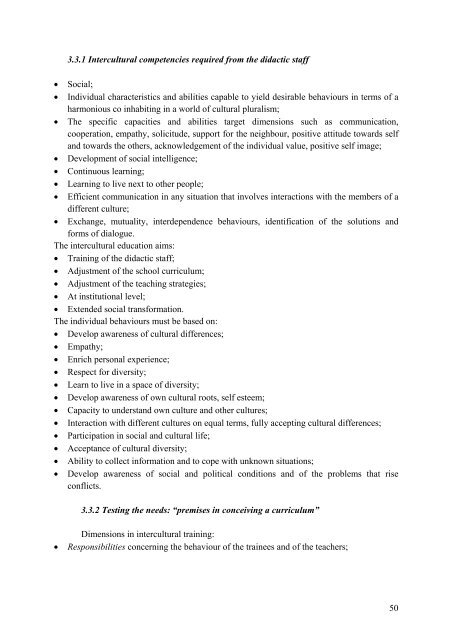Copyright © 2007, Editura ASE - BONUM
Copyright © 2007, Editura ASE - BONUM
Copyright © 2007, Editura ASE - BONUM
Create successful ePaper yourself
Turn your PDF publications into a flip-book with our unique Google optimized e-Paper software.
3.3.1 Intercultural competencies required from the didactic staff<br />
• Social;<br />
• Individual characteristics and abilities capable to yield desirable behaviours in terms of a<br />
harmonious co inhabiting in a world of cultural pluralism;<br />
• The specific capacities and abilities target dimensions such as communication,<br />
cooperation, empathy, solicitude, support for the neighbour, positive attitude towards self<br />
and towards the others, acknowledgement of the individual value, positive self image;<br />
• Development of social intelligence;<br />
• Continuous learning;<br />
• Learning to live next to other people;<br />
• Efficient communication in any situation that involves interactions with the members of a<br />
different culture;<br />
• Exchange, mutuality, interdependence behaviours, identification of the solutions and<br />
forms of dialogue.<br />
The intercultural education aims:<br />
• Training of the didactic staff;<br />
• Adjustment of the school curriculum;<br />
• Adjustment of the teaching strategies;<br />
• At institutional level;<br />
• Extended social transformation.<br />
The individual behaviours must be based on:<br />
• Develop awareness of cultural differences;<br />
• Empathy;<br />
• Enrich personal experience;<br />
• Respect for diversity;<br />
• Learn to live in a space of diversity;<br />
• Develop awareness of own cultural roots, self esteem;<br />
• Capacity to understand own culture and other cultures;<br />
• Interaction with different cultures on equal terms, fully accepting cultural differences;<br />
• Participation in social and cultural life;<br />
• Acceptance of cultural diversity;<br />
• Ability to collect information and to cope with unknown situations;<br />
• Develop awareness of social and political conditions and of the problems that rise<br />
conflicts.<br />
3.3.2 Testing the needs: “premises in conceiving a curriculum”<br />
Dimensions in intercultural training:<br />
• Responsibilities concerning the behaviour of the trainees and of the teachers;<br />
50


